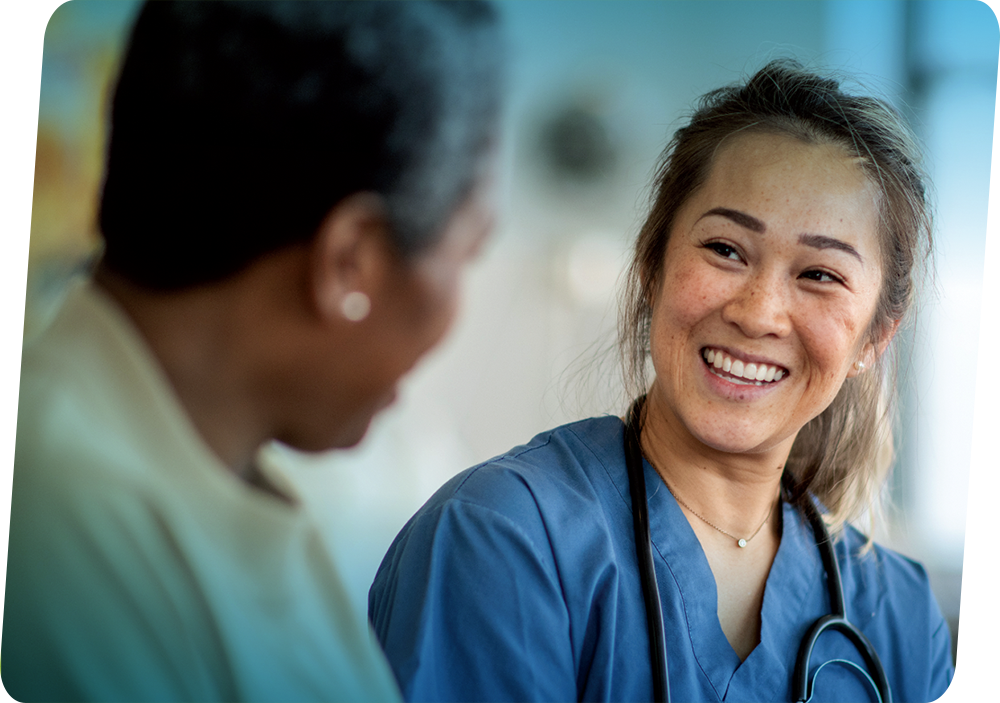
Impact Update
First Quarter 2023
Health Matters
Universal human dignity is one of our two core goals—and it guides us to focus on the essential care that ensures day-to-day wellbeing. Employers need to protect the health and safety of their workers. Hospitals need to provide reliable, equitable, quality care, especially in underserved communities. And pharmaceutical companies must make their products accessible and affordable to those most in need.
Right now global health experts, activists, non-profits, and investors like us are working together to help drive equitable progress in environmental health and health access. Advancements in medicine, diagnostics, and vaccines must go hand in hand with effective action to make them accessible to every individual. We’re a part of this effort, and we’re excited to share how our investments and engagements are helping create change.
In this edition
Engagement Overview
Domini meets with company executives on its own and in collaboration with other investors to encourage stronger policies and practices on the issues that matter to us. In alignment with our standards, we seek improved disclosure, more responsible practices, and address emerging issues with our companies. Through constructive interaction – via letters, dialogues, shareholder proposals, and proxy votes – Domini communicates its expectations to companies and encourages innovation and business models that uphold respect for human rights while contributing to ecological sustainability and resilience.

The UN Sustainable Goals (SDGs)
In the seven years since United Nations member states adopted the 2030 Agenda for Sustainable Development, the Sustainable Development Goals (SDGs) have been widely embraced by governments, civil society organizations, companies, and investors. The SDGs aim to address broad global topics such as poverty eradication, food security, protection of forests, sustainable cities and economic growth, gender equality, and climate change.
In each impact update, we’ll feature a few of our engagements alongside an investment highlight and show you which SDGs these are aligned with. Read more on the UN SDGs
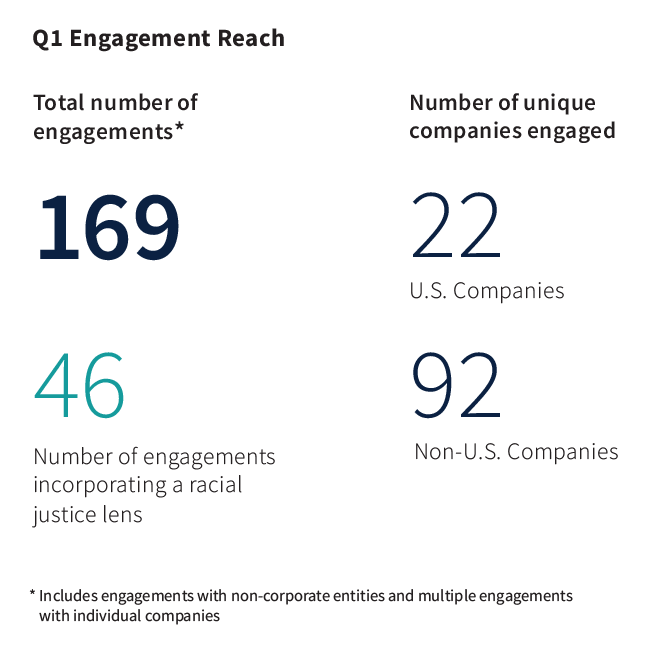
Expanding Global Access to Medicine


Millions of people in low- and middle-income countries (LMICs) do not receive essential healthcare, which is often unavailable or unaffordable. The Access to Medicine Foundation recently published its newest index, which evaluates companies on their approach to equitable access to medicine. Following each release, the Foundation hosts collaborative investor engagements with companies. We joined briefings on the new Access to Medicine Index results and participated in investor-led collaborative engagements with Bristol Myers Squibb and Novartis.
Our engagements with these companies focused on the challenge of improving access to medicines that are extremely difficult to deliver. Bristol Myers Squibb and Novartis have notable strengths in oncology. Delivering this kind of medicine takes expertise and complex infrastructure, but both companies are well-equipped to conduct access planning and develop effective strategies for cancer care in LMICs.
During our dialogues, Bristol Myers Squibb noted its efforts to build local healthcare capacity and train healthcare professionals. It also highlighted its impact on developing expertise in pediatric oncology in LMICs. Healthcare capacity is important, but so is local manufacturing. Novartis, which ranks fourth in the 2022 Access to Medicine Index, emphasized the importance of the manufacturing partnerships it is developing. They aim to facilitate technology transfer to manufacture medicines and build out healthcare systems and infrastructure, which are crucial to fulfill access for personalized and sophisticated medicines like oncology.
In both engagements, we learned about the important role that partnerships play for companies in expanding access, where they are leveraging and supporting global health partners such as the World Health Organization (WHO) and the Access to Oncology Medicines (ATOM) Coalition.
Investment Highlight: Domini Impact Equity Fund, Domini International Opportunities Fund, Domini Sustainable Solutions Fund, and Domini Impact International Equity Fund
GlaxoSmithKline is a global healthcare company that develops, manufactures, and markets pharmaceutical products including vaccines, over-the-counter medicines, and health-related consumer products. In 2022, it was the top-ranked company in the Access to Medicine Index—for the eighth consecutive time—as a result of its overarching strategy on medicine access. GSK has the largest research and development pipeline compared to its peers, with access programs for 92% of them. Over the next 10 years, it will invest more than $100 million in efforts to support health systems by strengthening access initiatives in lower-income countries.
Prioritizing Environmental Health
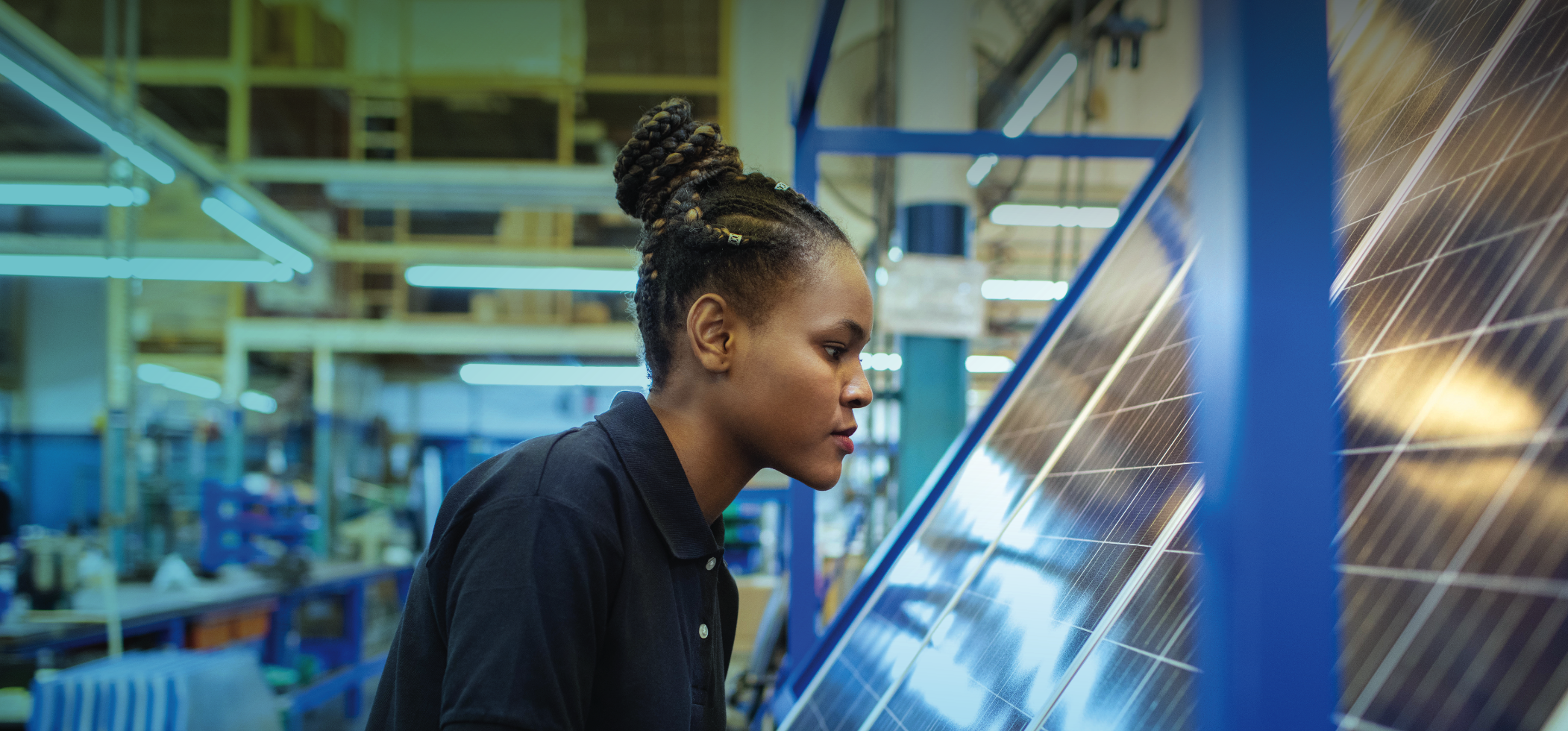

The Inflation Reduction Act has accelerated the transition to a low-carbon economy in the United States. As renewable energy companies use new incentives to increase manufacturing activity, it’s important that they responsibly assess and manage impacts on communities, both around manufacturing and further along their supply chains. We held a dialogue with Enphase Energy, whose microinverter technology allows consumers to convert solar energy for household use.
Our engagement focused on chemical management, environmental health, and environmental justice. The widespread deployment of solar technology will have a real impact on workers at every level of the supply chain. It’s crucial that Enphase is thorough in its product design and supplier oversight by establishing high standards on human rights protections, worker health, and safe chemical use. We’ll continue to share best practices on safer substitution for solvents in manufacturing, support the adoption of a strong chemical policy, and encourage integration of environmental justice into business growth opportunities so that the low-carbon transition doesn’t have unintended consequences.
Investment Highlight: Domini International Opportunities Fund and Domini Impact International Equity Fund
Hennes & Mauritz (H&M) is a Sweden-based company that sells clothing, accessories, footwear, cosmetics, and home textiles. Making clothes involves several chemical-intensive processes, such as washing, dyeing, and printing. H&M is a Zero Discharge of Hazardous Chemicals (ZDHC) signatory brand and maintains a list of harmful substances it avoids using. In 2022, 99% of its textile and leather supply chain—a total of 619 suppliers—was enrolled in ZDHC programs.
Safeguarding Our World’s Forests


Recent analysis by Global Canopy found that 40% of the companies contributing the most to deforestation don’t have a deforestation policy—with even fewer requiring commitments from their suppliers. We know that paper and packaging companies have different levels of insight into the forests they source from. Our engagements on this issue continue to focus on tracing the supply chain back to the forest level, especially as companies prepare to comply with upcoming regulations in the EU and UK.
In an engagement with the UK-based paper and packaging company, Mondi Group, we appreciated that it provides a high level of visibility into its sourcing regions, primarily in Europe, which are generally at a lower risk for deforestation. 100% of its wood is sourced responsibly, and it emphasizes biodiversity protection by ensuring that forests it sources from are able to regenerate.
We also met with Japanese printing company, Toppan, to discuss its approach to mitigating deforestation. We encouraged the company to adopt a strong no-deforestation policy and asked about its insights into the risk levels of forest regions it works with. There may be opportunities for Toppan to encourage responsible forest stewardship and communicate the benefits of sustainably sourced paper to its customers.
Investment Highlight: Domini Impact Equity Fund
International Paper manufactures paper and packaging products. With a variety of global standards and forest stewardship practices, the company’s sustainability certification program applies to approximately 994,000 acres of its North American forests. In addition, its acreage in Brazil is third-party certified for sustainable forestry. The company also uses country specific procurement policies for fibers from non-certified lands. International Paper aims to source 100% of fiber from sustainably managed forests or recovered fiber sources by 2030.
Improving Gender Diversity in Corporate Leadership


For years, we have engaged with the Japanese companies in our portfolio to acknowledge progress and call for better gender diversity at the leadership level. We recently wrote to 80 companies that did not meet our threshold for proxy voting—which is at least 30% representation of women on the board. We are encouraging them to add at least one woman to the next slate of board nominees and reach the 30% target by 2025.
Board gender diversity in Japan is steadily improving, but is still low. It reached 9.1% for all listed companies as of July 20221, while the percentage of women on boards in the index for larger companies, the TOPIX100, is slightly higher at 17.2%2. These figures lag well behind global trends. The MSCI World Index saw board gender diversity reach 31.3% in October 20223.
We are encouraged to see an increase in the average representation of women on the boards that we have engaged with—from 12.7% to 15.7% between the beginning of 2022 and 2023. We continue to stress that companies should collaborate to learn and adopt best practices for attracting, retaining, and promoting women. This groundwork helps foster a pipeline of women who are board-ready candidates.
Investment Highlight: Domini Impact Equity Fund, Domini International Opportunities Fund, and Domini Impact International Equity Fund
Recruit Holdings is a Japan-based global provider of human resources solutions. It helps provide career education and guidance to under-resourced groups—including refugees and people with disabilities—through non-profit partnerships and other initiatives. It also uses its website to promote information that employers can use to build out diversity recruiting capabilities. One of its largest subsidiaries, Glassdoor, allocates more than 50% of its sourcing efforts towards under-represented groups. Women accounted for 27% of Recruit Holdings’ board in 2022.
1. https://www.gender.go.jp/policy/mieruka/company/yakuin.html
2. https://30percentclub.org/chapters/japan/
3. https://www.msci.com/documents/10199/36771346/Women_on_Boards_Progress_Report_2022.pdf
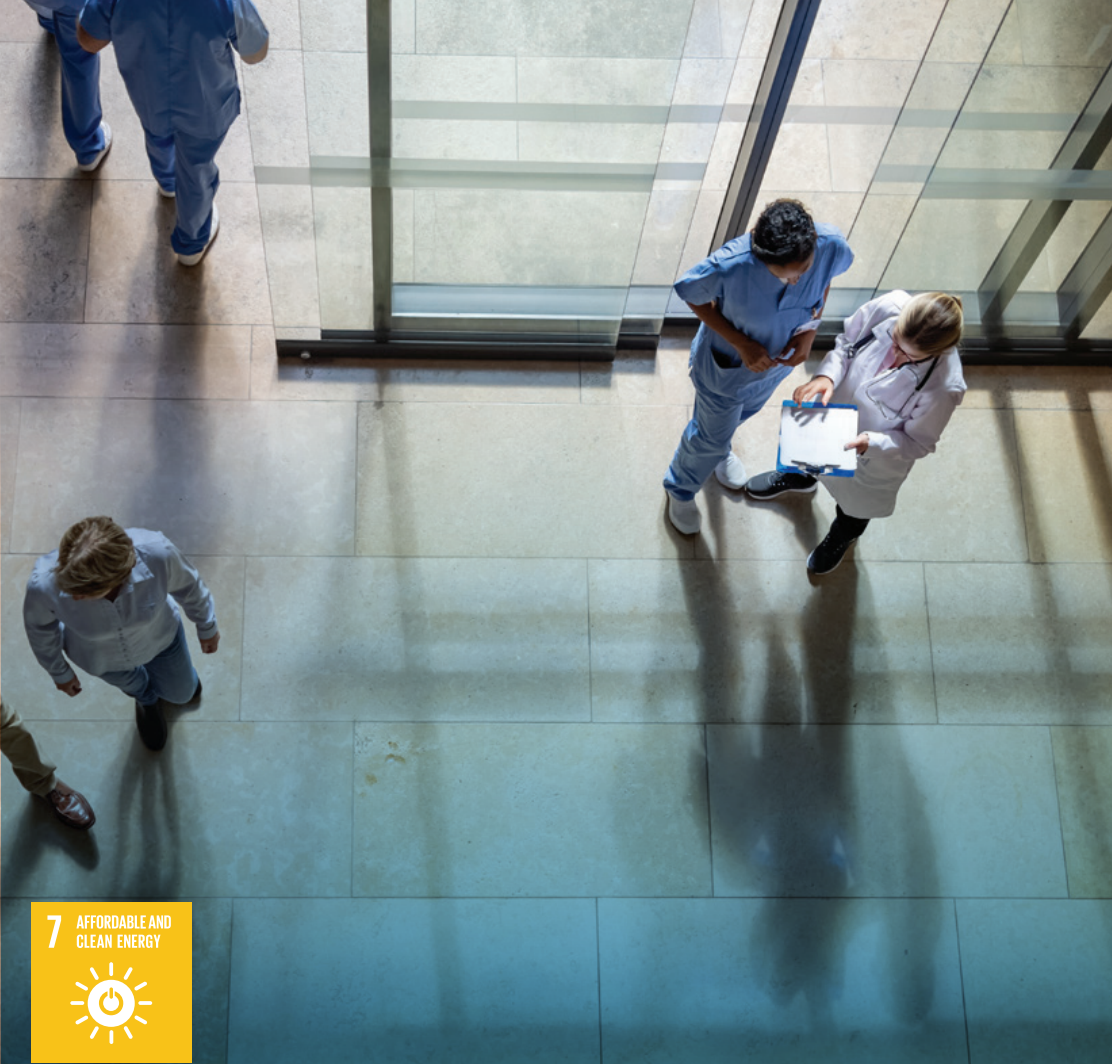
Bond Fund: Working Towards Equity and Transparency in Healthcare
Non-profit healthcare providers generally aim to serve patients regardless of their ability to pay or insurance coverage. Some hospitals are eligible for the 340B Drug Pricing Program, which gives hospitals access to discounted prescription drugs, enabling them to save money and reinvest the excess revenue back into the hospital.4 Bon Secours Mercy Health Hospital participates in this program, and we spoke with them to better understand how they put these savings to use after reporting highlighted a potential controversy and inequity.5 During this engagement, we discussed how they are using the savings from the drug purchases, whether they are being reinvested ethically, and if they are improving the quality of care for low-income patients, who the program was designed to benefit. We learned about the hospital’s approaches to program oversight and reporting—and honed in on some follow up areas of inquiry.
This engagement prompted us to begin outreach to other non-profit hospitals held in the Bond Fund, including Kaiser Foundation Hospital and Beth Israel Lahey Health, to evaluate whether their participation
in the 340B Program is aligned with their non-profit mission.
4. https://www.hrsa.gov/opa
5. https://www.nytimes.com/2022/09/24/health/bon-secours-mercy-health-profit-poor-neighborhood.html
Domini Impact Bond Fund Theme Allocations*


Access to Housing
Supports affordable mortgage credit & rental properties, multifamily collateralized mortgage obligations, and other residential mortgage backed securities.
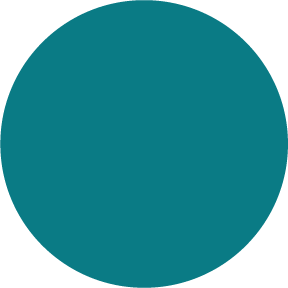
Corporate Debt**
Supports corporate general obligations & bank loans of companies that meet Domini’s Impact Investment Standards.
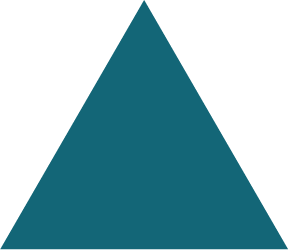
Economic & Community Development
Supports nonprofit education, rural & agricultural communities, creative economy & public interest, transportation, access to water, business & job creation, and community development financial institutions.
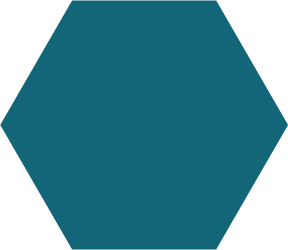
Low-Carbon Transition
Supports renewable energy, energy efficiency and green buildings, sustainable cities, sustainable forestry and conservation, and corporate green and sustainability bonds.
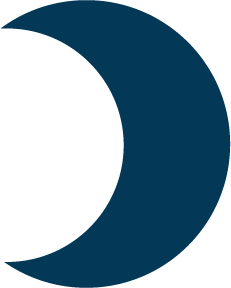
Non-Housing Asset-Backed Securities
Supports commercial mortgage-backed securities, auto loans, and other asset backed securities that meet Domini’s Impact Investment Standards.
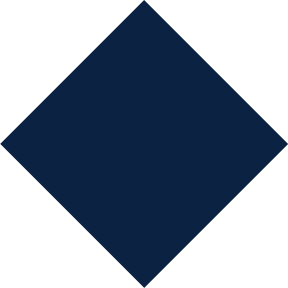
Health, Well-Being & Aging Society
Supports nonprofit healthcare and research facilities, housing and healthcare services, and pensions.
* Based on portfolio holdings as of 3/31/2023, excluding cash & cash equivalents, cash offsets, futures, swaps and options with the exception of short-term U.S. Agency bonds and Certificates of Deposit, which are reflected in this reporting. Numbers may not sum to totals due to rounding. The composition of the Fund’s portfolio is subject to change. Visit domini.com to view the most current list of the Fund’s holdings.
** “Corporate Debt” includes general-obligation corporate bonds, bank loans, and corporate debt not classified under other themes.

Investment Highlight: Domini Impact Bond Fund
Advocate Aurora Health is a non-profit health system that is affiliated with numerous colleges and universities to support medical students, residents and fellows, and nursing students. It is a member of the Healthcare Anchor Network, whose long-term goal is to guide a critical mass of health systems towards adopting institutional priorities of improving community health and investing in equitable, local economic impact.
Zoom in: The Access to Medicine Index
At Domini, we believe that quality healthcare is a right. But essential medicines are unavailable or unaffordable to millions of people globally, especially in low- and middle-income countries where there’s less commercial incentive to deliver medicine. It’s crucial that the world’s largest pharmaceutical companies make rapid, meaningful progress on expanding access to the healthcare that people need most.

The Basics
The Access to Medicine Foundation was formed in 2003, with the goal of improving access to healthcare for underserved global populations. In 2008, the Foundation published its first Access to Medicine Index (the Index), ranking the world’s largest pharmaceutical companies on their role in providing access to medicine in low- and middle-income countries (LMICs). Since then, the Foundation has released an Index every two years, focusing on three main areas—governance of access, research and development, and product delivery—with an emphasis on disease areas that most affect people in LMICs, such as neglected tropical diseases and HIV/AIDS. In recent years, the Foundation has expanded its research to encompass medical gas, generics, diagnostics, and vaccines—and has published an additional Index that ranks companies on their work to address antimicrobial resistance.
The Index goes beyond just assigning a grade to pharmaceutical companies. Its aim is to improve access by providing companies with tailored roadmaps for improvement. Each company “Report Card” describes a number of opportunities where the company can improve access—such as by forming manufacturing or distribution partnerships for a specific drug, or by expanding its pipeline in disease areas where it has research strengths. The Foundation also publishes a Methodology Report that lays out its metrics and details any changes to the evaluation process that have been made in the prior year. This helps underscore critical access issues while providing companies and users of the Index with more information to understand assessments.
Impact Through Collaboration
The Index is the cornerstone of the Foundation’s model for change. Its rankings raise the profile of global health issues, offer public recognition to companies that are implementing effective policies, and create a race to the top within the healthcare sector to achieve progress on access and equity. But the Foundation also takes steps to play a more active role in delivering results.
Following the release of each biannual Index, the Foundation works to elevate the impact of its research by communicating and collaborating with various stakeholders. It meets with the companies it evaluates, sharing Index results and discussing paths towards improvement. It works directly with policy makers, liaising with governments and NGOs to communicate what policy conditions would help companies make progress.
The Foundation also helps institutional investors use the Index to better manage risks and opportunities in the healthcare sector and facilitates direct engagement between investors and companies. To date, over 150 investors managing assets of more than $25 trillion have committed to use the data and insights.
Domini’s Research and Engagement
Domini joined an investor commitment to use the Index. Our research team uses the Index and its data when determining whether pharmaceutical companies meet our investment standards. Our engagement team uses the Index to shape engagement priorities within the healthcare sector. We’ve led investor engagements with Eisai and have been part of dialogues with GlaxoSmithKline, Novartis, Pfizer, and Sanofi, among other pharmaceutical companies.
We’ve also been able to communicate directly with the Foundation, sharing our investment standards and priorities in healthcare. We’ve provided feedback on the Index methodology, suggesting areas of expansion and improvement.
Domini News

The Report Is In. The Impact Is Out. Last year’s environmental and social challenges brought about ambitious work and new solutions. Our portfolios further reduced their carbon footprints versus their benchmarks. We helped to advance climate and racial justice, work collaboratively towards the low-carbon transition, and enhance care for human rights in conflict-affected areas. Our newly published 2022 Impact Report explores all this work and much more—through insights, charts, and interviews with our team. Visit domini.com/2022impactreport

Striving for Better Working Conditions. Impact investing, grounded in a human rights approach and stakeholder engagement, can elevate key issues and amplify the change we need. Our Engagement Director, Mary Beth Gallagher, recently co-wrote an article about the worker-driven social responsibility movement. She highlights, among other initiatives, the Fair Food Program, whose worker-driven model has enabled tomato farmworkers to reduce sexual harassment, forced labor, and wage theft in the tomato supply chain. Read more at domini.com/humanrights

Trains, Buses, and Bikes. In February, we hosted a lively webinar: Designing the Next 50 Years of Transportation. It was great conversation that brought together transportation experts from the
New York MTA, the C40 Cities sustainability network, and a Parisbased mobility start-up called Vianova. Together, they discussed electric bikes and electric buses, sustainable transportation in
developing countries, how to bridge policy with on-the-ground data, and much more. Here’s a short video with some of our favorite insights from the webinar: Designing the Next 50 Years of Transportation
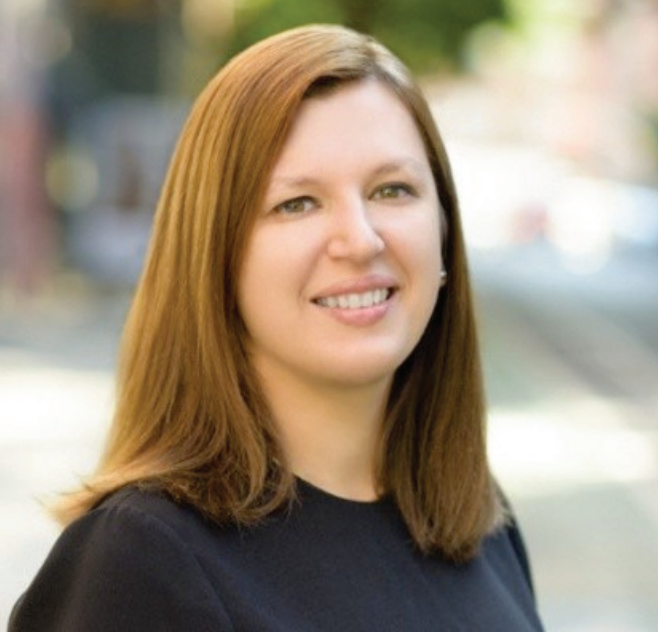
Doing Research Our Way. Investing for good starts with thorough research—into companies and industries, as well as the ecosystems and communities they affect. We believe we’re best
positioned to identify strong, long-term investments by working independently and gathering the data that matters most. That’s why we do our research in-house. Want to learn more? Watch our Director of Research, Lionella Pezza, give a quick overview of the research process at Domini at domini.com/research
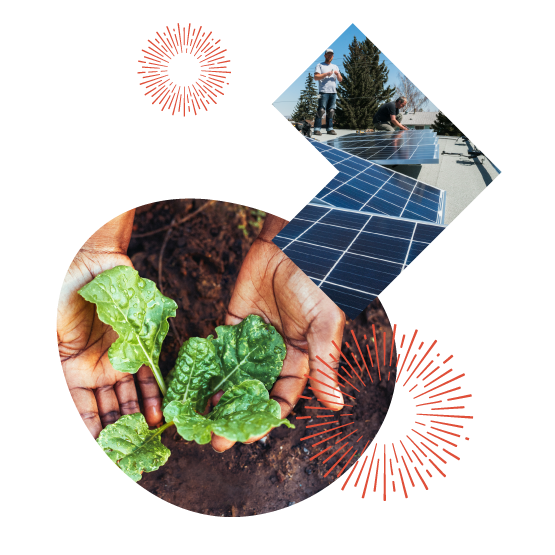
The secret to making an impact is small.
It starts by subscribing to news and updates.
